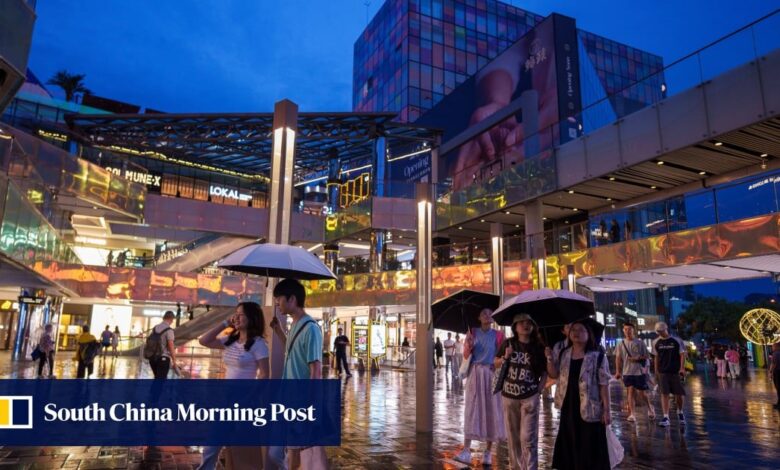Beijing’s retailers rebel against rent hikes, stalling any return to pre-pandemic levels

Beijing’s retailers are resisting increases in rental charges in the Chinese capital city’s shopping centres amid a widespread consumption slump, making it unlikely for rents to return to pre-pandemic levels any time soon, analysts said.
Many retail shops are very sensitive to the slightest hike in rents in a stalling economy, putting pressure on landlords to cut prices, or even soften their lease terms to retain tenants, said Sun Tin, director and head of research at CBRE North China.
“The higher a tenant’s gross margin, the better its capacity to pay rent, but it’s hard for landlords to find these high-earning tenants these days,” Sun said, adding that it would be “very challenging” for rents to recover to pre-pandemic levels this year.
As the mainland’s consumption slump and consumers’ lack of confidence spread through the entire economy, many retailers are bleeding out on rent, even if average leases are down by 17 per cent from their pre-pandemic peak, according to data compiled by Jones Lang LaSalle (JLL), a real estate services company.
That is the case at théATRE, a tea-and-dessert cafe in Beijing’s Sanlitun area that is aimed at middle-income families and white-collar consumers. The cafe, which sells jasmine matcha cake for 288 yuan (US$39.70) each, is looking for a 100-square metre (1,076 sq ft) location with steady foot traffic in a core commercial district for a new store. The brand has multiple branches in Beijing and Shanghai.
Rental charges, which account for around 30 per cent of total costs, have lagged behind the economic slump, because leases usually last for three years, and the landlords have not adjusted their budgets, said théATRE’s spokesperson. Cafes had been reducing the footprint of their stores recently to improve their per unit sales and ease the rent pressure, the spokesperson said.
In the second quarter, the average rent across Beijing’s retail property market bounced back from its trough in 2023, with urban monthly rents rising 0.9 per cent on a quarterly basis to 771 yuan per square metre. The second quarter also marked the fourth consecutive quarter where rent across the city’s retail segment grew, according to a report published this week by JLL.
Net absorption in the suburban market reached 249,300 sq m in the second quarter, with the first-half figure nearing the full-year 2023 level. Meanwhile, the urban market vacancy rate has dropped to a “healthy and active” 4.5 per cent, according to Ji Ming, research director for JLL North China.
“We are seeing active demand from F&B and fashion retailers to expand in the city,” said Ji, adding that food and beverages have led the pack by adding 32 per cent of the total floor area to the retail segment in the second quarter, followed by fashion brands at 23 per cent. “These brands typically have lower per-customer transactions but higher frequency of consumption.”
A host of mass-market fashion retailers are also expanding in the city. In the first quarter of this year, a blueberry, a Hangzhou-based fast-fashion brand targeting Gen Z customers, opened a new store in the basement of Hopson One Mall, one of Beijing’s hottest shopping malls located near the bustling central business district. In the second quarter, One Moment, another local fashion brand, launched a shop in THE BOX, a trendy commercial district favoured by the city’s youths.
“Malls that are big enough and can offer a variety of activities for different clusters of customers, especially families, are doing great in terms of sales and foot traffic, even as the broader economy is faced with headwinds,” said Ava Zhang, associate director of retail services at Savills Northern China. “But there probably will not be many opportunities for Beijing to supply large-scale commercial land any time soon.”
Source link

